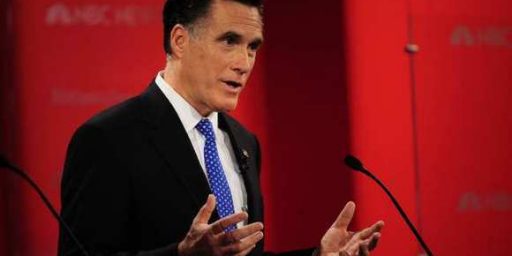President Bush’s Social Security Plan
Well President Bush has come out with a plan and he is going, in part, with reducing benefits in a progressive manner. Basically the more money you make, the lower your retirement benefits will be. The idea, to me, seems to be that since a person might earn say, $500,000 a year that they have plenty of opportunity and funds to save for retirement so the “safety net” for them shouldn’t be the same as somebody making $15,000 a year. If you make under $20,000/year (in today’s dollars) your benefits will not be cut. This means that the people in the bottom third of the income distrubution will not see any change to their benefits. Above $20,000/year and benefits are reduced in a progressive manner.
Interestingly enough Prof. Krugman has come out against reducing benefits for the wealthy in his latest New York Times column.
The administration and its apologists emphasize the fact that under the Bush plan, workers earning higher wages would face cuts, and they talk as if that makes it a plan that takes from the rich and gives to the poor. But the rich wouldn’t feel any pain, because people with high incomes don’t depend on Social Security benefits.
Cut an average worker’s benefits, and you’re imposing real hardship. Cut or even eliminate Dick Cheney’s benefits, and only his accountants will notice.
Technically he is correct. Those who are very well off wont feel much if any pain from even the elimination of their Social Security benefits. However, lets take a look at some of Krugman’s numbers and do some “what if’s”.
The average worker – average pay now is $37,000 – retiring in 2075 would face a cut equal to 10 percent of pre-retirement income. Workers earning 60 percent more than average, the equivalent of $58,000 today, would see benefit cuts equal to almost 13 percent of their income before retirement.
But above that level, the cuts would become less and less significant. Workers earning three times the average wage would face cuts equal to only 9 percent of their income before retirement. Someone earning the equivalent of $1 million today would see benefit cuts equal to only 1 percent of pre-retirement income.
Let’s suppose we can change Bush’s proposed plan anyway we want and let us also ignore the issue of the actuarial imbalance (i.e. the projections that Social Security is going to run out of money around 2041). Suppose we cut the average workers benefits cut in half and doubled the benefits cut for the guy with a million dollar annual salary. We’d still have the same problem that Krugman is pointing too. The rich guy would see a benefits cut of 2% and the average income earner a cut of 5%. But the rich guy is taking a benefits cut that is much, much larger than the average income guy (two and a half times as large). If we use Jason Furman, Krugman’s source, we see the following numbers with our pretend scenario:
- Average Income Earner’s Benefit Cut: $3,815
- Million Dollar Income Earner’s Benefit Cut: $43,616
And keep in mind that under current law the Million Dollar Guy is going to be maxed out with a benefit of $44,236. In other words, even if we practically eliminate the currently scheduled benefits for the Million Dollar Guy this criticism is still valid. We’d either have to come up with some sort of “negative benefit” for the Million Dollar Guy or we have to reduce the benefits cut for the Average Income Earner dramatically.
Now, lets revisit the issue of actuarial imbalance. If we reduced the benefits cut for the people who are not rich and who are not in the bottom third of the income distribution then there is no way the plan can work in reducing the actuarial imbalance. Further, Krugman’s criticism can be leveled at other plans such as the Diamond-Orszag plan which would also reduce the benefits for those who have higher incomes.
Diamond-Orszag would also reduce benefits through various changes to the benefit formula. All primary insurance amount (PIA) factors–the values in the formula that determines benefit levels based on past earnings–would be reduced. The size of the reduction would be based in part on actual improvements in life expectancy and would grow over time, to 12 percent in 2050 and 23 percent in 2105, CBO projects.(12) This provision would reduce scheduled outlays by 0.4 percent of GDP in 2105.
The top PIA factor, which applies only to higher-earning beneficiaries, would be reduced by an additional 33 percent by 2031, when it would reach 0.096, 36 percent lower than the current-law rate of 0.15.
Further, the Diamond-Orszag plan would increase the payroll tax.
Our plan combines its gradual benefit reductions with a gradual increase in the payroll tax rate. The combined employer-employee payroll tax rate would rise from 12.4 percent today to 12.5 percent in 2015, 13.2 percent in 2035, 14.2 percent in 2055 and 15.4 percent in 2078; it would continue to rise slowly over time thereafter.
This is going to hurt those in the lower end of the income distribution the most since Social Security is a regressive tax scheme. I don’t see how Krugman can like this plan either.
Prof. Krugman may have effectively put himself into a nice pickle. All his ranting and raving about there being no crisis/problem with Social Security seems to have put him in the position of arguing against anything and everything. Well that and his seemingly irrational attitude towards President Bush doesn’t help him much either. My guess is it is another bad day for Krugman’s cat.






Krugman’s point, as I took it, was that cuts will be disproportionately harsh for those making more than $20K but still well below a really middle-class salary, as opposed to cuts on the upper class. I don’t think anyone can really dispute the accuracy of this.
The most rational thing to do might be to make SS strictly a welfare program, with no money going to those already willing to support themselves. I think the political argument against this is that people will be more in favor of cutting benefits for the old if they don’t see themselves as in line for those same benefits. Given what’s happening to Medicaid, this argument seems to have something going for it.
Krugman’s point, as I took it, was that cuts will be disproportionately harsh for those making more than $20K but still well below a really middle-class salary, as opposed to cuts on the upper class. I don’t think anyone can really dispute the accuracy of this.
Yes, but he ends up being dishonest because Social Security income is already capped at $90,000 both for tax purposes and for the purposes of calculated benefits. Given that, it’s absolutely impossible for any cuts to not be a higher percentage of income for those below $90,000 than those above it. If you change the comparison to the cuts as a percentage of contributions, it’s quite different.
Even these cuts keep benefits growing at the pace of inflation, remember.
As you correctly note, one of the problems is that Social Security defenders can’t decide whether Social Security is an insurance/welfare program, or some sort of forced retirement savings scheme. If it’s the latter, then you have to look at contributions and it’s certainly not unfair to the middle class. If it’s the former, these changes clearly move it in the direction of being an insurance/welfare scheme. I agree that it should be a welfare insurance program designed so that seniors don’t fall into poverty just because they lived too long. I think that the President’s plan is a good first step towards getting there.
“Krugman’s point, as I took it, was that cuts will be disproportionately harsh for those making more than $20K but still well below a really middle-class salary, as opposed to cuts on the upper class.”
The only rational measure of the harshness of the cut in benefits is the percentage reduction in benefits. Krugman was saying that the increasing harshness of the cut won’t match the increasing wealth of the person, which is a hardly a reason to dislike the proposal. It looks to me like he desperately went fishing for any numbers that look bad, knowing that his target audience wouldn’t know enough math to correct him.